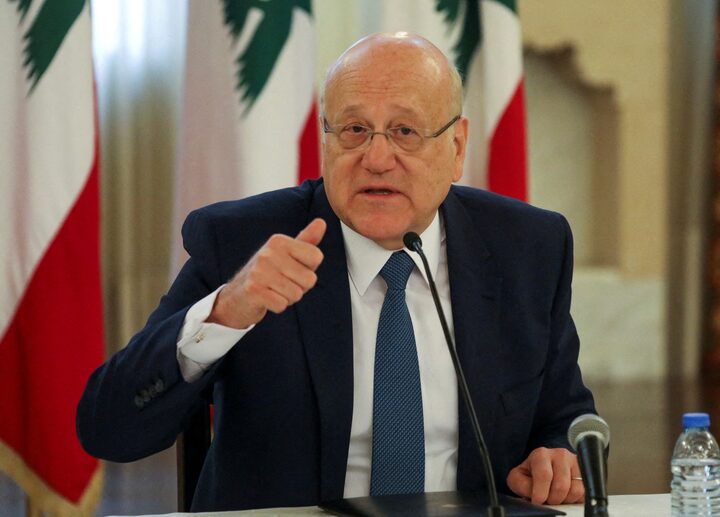- Home
- Billionaires
- Investing Newsletters
- 193CC 1000
- Article Layout 2
- Article Layout 3
- Article Layout 4
- Article Layout 5
- Article Layout 6
- Article Layout 7
- Article Layout 8
- Article Layout 9
- Article Layout 10
- Article Layout 11
- Article Layout 12
- Article Layout 13
- Article Layout 14
- Article Sidebar
- Post Format
- pages
- Archive Layouts
- Post Gallery
- Post Video Background
- Post Review
- Sponsored Post
- Leadership
- Business
- Money
- Small Business
- Innovation
- Shop
Recent Posts
Najib Mikati: Navigating Leadership in Turbulent Times | Richest person in Lebanon

Najib Mikati, a prominent Lebanese politician and billionaire businessman, has been a central figure in Lebanon’s political and economic landscape for decades. Born on November 24, 1955, in Tripoli, Lebanon, Mikati’s journey from a young entrepreneur to a political heavyweight mirrors the complex and often tumultuous history of his homeland. With a reputation for pragmatism and resilience, Mikati has played a pivotal role in navigating Lebanon through some of its most challenging periods.
Mikati’s early life was deeply rooted in the coastal city of Tripoli, known for its vibrant history and culture. After completing his education in Lebanon, he pursued higher studies abroad, earning an MBA from the prestigious INSEAD business school in France. He later attended Harvard University’s Advanced Management Program, further solidifying his business acumen. These formative years laid the foundation for his entrepreneurial ventures, which would eventually make him one of Lebanon’s wealthiest individuals.
In the late 1970s, Mikati co-founded M1 Group with his brother, Taha Mikati. The company initially focused on telecommunications, launching the telecommunications firm Investcom in 1982. Under Mikati’s leadership, Investcom rapidly expanded, becoming a major player in the Middle East and Africa’s telecom industry. The company’s success culminated in its public listing on the London Stock Exchange in 2005 and its subsequent sale to South Africa’s MTN Group for $5.5 billion in 2006. M1 Group diversified its portfolio to include investments in real estate, fashion, energy, and aviation, cementing Mikati’s status as a global business leader.
Despite his business success, Mikati’s entry into politics was driven by a sense of duty to his country. He made his political debut in 1998 when he was appointed Minister of Public Works and Transport. During his tenure, he focused on infrastructure development, advocating for improved transportation networks and public services. His pragmatic approach and ability to work across Lebanon’s deeply divided political spectrum earned him widespread respect.
Mikati’s political career reached new heights when he first became Prime Minister in 2005, following the assassination of former Prime Minister Rafik Hariri. This period was marked by intense political turmoil and international scrutiny, as Lebanon grappled with the aftermath of Hariri’s death and the subsequent withdrawal of Syrian forces after nearly three decades of dominance. Mikati’s tenure was brief but significant; he served as a consensus candidate tasked with steering the country through a critical transitional phase and organizing parliamentary elections.
In 2011, Mikati returned as Prime Minister, leading a government dominated by the Hezbollah-led March 8 alliance. This tenure was marked by significant challenges, including the spillover effects of the Syrian Civil War, political infighting, and a worsening economic crisis. Despite these obstacles, Mikati sought to maintain stability and foster dialogue among Lebanon’s factions. However, his government faced criticism for its inability to implement substantial reforms or address systemic corruption.
Mikati’s third term as Prime Minister began in September 2021, amidst one of the worst economic crises in Lebanon’s history. The country was grappling with hyperinflation, widespread poverty, and the aftermath of the catastrophic Beirut port explosion in August 2020. The explosion had exacerbated public distrust in Lebanon’s political elite, leading to mass protests and demands for accountability. Mikati’s government faced the monumental task of negotiating with international donors, implementing much-needed reforms, and restoring public confidence.
Throughout his political career, Mikati has been known for his pragmatic and conciliatory approach. He often positions himself as a unifying figure, seeking to bridge the divides between Lebanon’s rival factions. However, this approach has also drawn criticism, with opponents accusing him of prioritizing consensus over bold decision-making. His wealth and business dealings have also been subjects of scrutiny, with allegations of benefiting from Lebanon’s entrenched cronyism.
Despite these criticisms, Mikati’s supporters argue that his business expertise and international connections are assets in addressing Lebanon’s economic woes. His ability to secure external funding and negotiate with global institutions has been highlighted as a key strength. Under his leadership, Lebanon resumed talks with the International Monetary Fund (IMF) to secure financial assistance, a critical step toward economic recovery. However, progress has been slow, hampered by political gridlock and resistance to reforms from various interest groups.
Mikati’s personal life reflects his multifaceted identity as both a global businessman and a Lebanese patriot. He is married to May Mikati, and the couple has three children. Known for his philanthropic efforts, Mikati has supported numerous educational and social initiatives through the Mikati Foundation. His contributions to the American University of Beirut and other institutions underscore his commitment to fostering education and development in Lebanon.
As a leader, Mikati’s legacy is still being shaped. His tenure as Prime Minister during critical junctures in Lebanon’s history has made him a central figure in the country’s narrative. Whether he will be remembered as a stabilizing force or a symbol of the status quo remains a subject of debate. What is undeniable, however, is his enduring influence on Lebanon’s political and economic landscape.
In conclusion, Najib Mikati’s life and career embody the complexities of leadership in a nation marked by resilience and turmoil. His journey from a young entrepreneur in Tripoli to a three-time Prime Minister reflects his determination to navigate Lebanon through its multifaceted challenges. As Lebanon continues to face an uncertain future, Mikati’s role as a pragmatic mediator and seasoned leader will remain crucial in shaping the country’s path forward.
- Beirut explosion aftermath
- Beirut port explosion
- consensus leadership
- crisis management
- economic recovery Lebanon
- education in Lebanon
- Hezbollah
- hyperinflation in Lebanon
- IMF negotiations
- International Diplomacy
- international funding Lebanon
- Investcom
- Lebanese business leaders
- Lebanese businessman
- Lebanese corruption
- Lebanese economy
- Lebanese elite
- Lebanese factions
- Lebanese infrastructure
- Lebanese philanthropy
- Lebanese Prime Minister
- Lebanese protests
- Lebanese reforms
- Lebanese reforms debate
- Lebanese wealth
- Lebanon economic crisis
- Lebanon politics
- Lebanon public trust
- Lebanon’s challenges
- Lebanon’s future
- M1 Group
- March 8 alliance
- Middle East politics
- Mikati Foundation
- Mikati Harvard
- Mikati’s legacy
- Mikati’s pragmatism
- Najib Mikati
- Najib Mikati achievements
- Najib Mikati biography
- Najib Mikati controversies
- Najib Mikati family
- political gridlock
- Political Leadership
- Rafik Hariri assassination
- Syrian Civil War spillover
- Tripoli history
- Tripoli Lebanon
- Tripoli’s culture
Recent Posts
Categories
- 193 Countries Consortium Partner1
- 193cc Digital Assets2
- 5G1
- Aerospace & Defense48
- AI37
- Arts3
- Banking & Insurance11
- Big Data3
- Billionaires1,467
- Boats & Planes1
- Business332
- Careers13
- Cars & Bikes79
- CEO Network1
- CFO Network17
- CHRO Network1
- CIO Network1
- Cloud10
- CMO Network18
- Commercial Real Estate7
- Consultant1
- Consumer Tech194
- CxO1
- Cybersecurity73
- Dining1
- Diversity, Equity & Inclusion4
- Education7
- Energy8
- Enterprise Tech29
- Events11
- Fintech1
- Food & Drink2
- Franchises1
- Freelance1
- Future Of Work2
- Games149
- GIG1
- Healthcare79
- Hollywood & Entertainment203
- Houses1
- India’s 1000 Richest1
- Innovation46
- Investing2
- Investing Newsletters4
- Leadership65
- Lifestyle11
- Manufacturing1
- Markets20
- Media327
- Mobile phone1
- Money13
- Personal Finance2
- Policy569
- Real Estate1
- Research6
- Retail1
- Retirement1
- Small Business1
- SportsMoney42
- Style & Beauty1
- Success Income1
- Taxes2
- Travel10
- Uncategorized14
- Vices1
- Watches & Jewelry2
- world's billionaires1,436
- Worlds Richest Self-Made Women2
Related Articles
Antonia Ax:son Johnson & Family: A Legacy of Leadership and Sustainability
Antonia Ax:son Johnson stands as one of the most influential figures in...
By 193cc World's BillionairesMay 28, 2025The Life and Legacy of Roman Abramovich & Family
Roman Abramovich, a name synonymous with immense wealth, high-profile acquisitions, and global...
By 193cc World's BillionairesMay 28, 2025James Dyson: The Visionary Inventor Who Revolutionized Home Technology
James Dyson is a name synonymous with innovation, resilience, and engineering brilliance....
By 193cc World's BillionairesMay 28, 2025Brian Chesky: The Visionary Behind Airbnb’s Global Revolution
Brian Chesky, co-founder and CEO of Airbnb, stands as one of the...
By 193cc World's BillionairesMay 28, 2025















Leave a comment